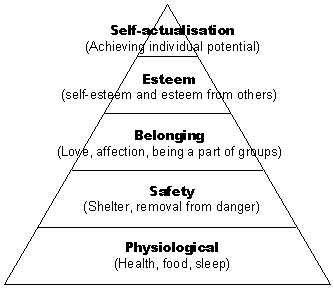By Linda Adams, President of GTI
For our daily lives to have meaning and purpose, it’s important to be aware of what our needs are. That sounds so obvious and simple and yet it isn’t at all. It’s often quite difficult to identify our real needs.
When we aren’t in touch with them, we often float through life or periods of it without direction or purpose. In addition, when we get into conflicts with others, they’re often hard to resolve because one or both of us aren’t aware of what our real, underlying need is.
In our courses, we use a model developed by well-known psychologist, Dr. Abraham Maslow, to help people understand more about the nature of human needs. Maslow believed that people have five levels of needs as shown in this pyramid:
Level 1 – Physical survival–food, water, air, sleep, shelter–things we cannot live without.
Level 2 – Safety and security–feeling physically and psychologically safe. We feel fear when these needs aren’t met and when people are fearful, they work on getting rid of the fear, not the task at hand.
Level 3 – Emotional and social–having relationships with others–family, friends, co-workers. These include needs for love, acceptance, belonging and intimacy. When these needs aren’t met, people experience loneliness, anxiety and depression.
Level 4 – Achievement and success–being productive, achieving, accomplishing things that give us feelings of self-esteem and self-worth. We need to feel that we’re making a contribution, doing something that matters.
Level 5 – Self-Actualization–When we are getting Level 1-4 met, a need for self-actualization – a need to fulfill our potential comes into focus. We are motivated to make the most of our unique talents and abilities, to be the best that we can be, “to become everything one is capable of becoming…” Some of the characteristics of self-actualization are feelings of wholeness, joyfulness and a heightened awareness of living. Think of times when you have experienced such moments.
How Does Maslow’s Model Fit with the Gordon Model?
First, understanding this Hierarchy of Needs makes you more aware that we all have many basic requirements that are necessary and essential to our survival, health and well-being and that our behavior is geared toward meetings those needs. It helps you see your own behavior and that of the people with whom you live and work in a different frame of reference. Instead of labeling behavior as “bad” or “selfish” or “misbehavior”, it can be seen as “need-meeting”.
Next, knowing the communication and conflict resolution skills gives you tools that are invaluable in getting many of those needs met, especially Levels 3-5.
Active Listening is an essential skill both for helping yourself and for facilitating others in getting in touch with real, underlying needs. When you can listen to yourself and accept your feelings and needs fully, you free yourself to move forward, to grow and develop. Further, self-acceptance leads to acceptance of others as they are–without judgment–and so allows them the same opportunity.
Equally important is the ability to express your feelings and needs in a clear, congruent way so that you can become and remain self-aware and authentic, and can continue to move forward to fulfill your life goals.
And finally, when you’re in conflict with another person, being able to self-disclose and listen with empathy and understanding are necessary skills for identifying the real needs of both people from the start so that the conflict can get resolved and stay resolved.
Take a few minutes to gauge where you are on Maslow’s hierarchy at this point. Also think about the people with whom you live and work and at what level(s) they are/might be functioning. Use this new awareness as you make daily decisions about your own life and as you relate to your family, friends and co-workers.


